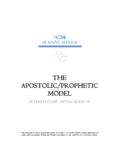Transcription of PASTORAL STUDIES PART 1 - NCMI Global
1 NCMI TRAINING MANUAL PASTORAL STUDIES part 1 By Leon and Pat Van Daele, adapted by Dr. Noel B. Woodbridge This document may be duplicated whole, or in part , in any form (written, visual, electronic or audio) without express written permission, providing it is not used for commercial purposes. 2 PREFACE TO THE COURSE Writing a course on the subject of pastoring the Flock of God, at this point in the history of the Church, is both a privilege and an enormous responsibility. We live in times of accelerated reformation, formation and change in the Church of Jesus Christ. Accelerating change on a Global scale has gripped the attention of the world.
2 The explosion of science and technology is demanding a degree of alertness and flexibility never before experienced by man. God will not be left behind. He has already been to the end and declared it from the beginning (Isa. 46:10). Where His Church is in step with Him, she finds herself in constant transition and change. He wants a church that will be abreast of world trends and relevant to the people in the street. Increasing revelation concerning His strategies as well as a fuller understanding of Truth is necessary. This is being experienced by many of His people today. It is necessary to keep the Church on the cutting edge of History.
3 Writing in this context makes one feel very vulnerable. On our shelves are many books written by those who have both achieved more for God and had better minds than some of us. However, one is aware that that was then, and this is now. Significant and far-reaching changes are taking place in our understanding of the nature of the Church. There is a keen awareness that, although we can see more than we did before, we are still only scratching the surface of the profound mystery (Eph. 5:32) of the nature of the Church. Thus after having committed our understanding to paper, how much more will we understand in the near future? May we, therefore, urge those who study this material to avoid the danger of concluding that this is the last word on the subject.
4 Rather, as we should do with all Truth, let us hold fast to what we have, while we keep our eyes, heads and hearts wide open for the ongoing work of the Holy Spirit as He .. guides (us) into all (John 16:13). The day will come when this material may no longer adequately serve the purpose for which it was written. With respect to those who are taken up with being politically correct we make no apology for using the language of the Bible in terms of gender. Man is often used to denote the whole human race and is not intended to perpetrate a sexist point of view. We write in the light of the Biblical principle that while there are distinctive roles laid down by the Almighty for men and women, at the same time.
5 There is neither Jew nor Greek, slave nor free, male nor female, for you are all one in Christ Jesus (Gal. 3:28). 3 UNIT ONE THE BIBLICAL MODEL OF THE LOCAL CHURCH BE SHEPHERDS OF GOD S FLOCK .. (1 Peter 5:2) Learning Outcomes: After completing this unit you should be able to: (1) Recognise the importance of the local church in the achievement of the Great Commission. (2) Understand the Biblical model of the local church. (3) Compare the organisational life of the church with its organic life ( the Covenant Family relationship). (4) Understand the nature of the organic life of God. ACHIEVING THE GREAT COMMISSION THROUGH THE LOCAL CHURCH Many different techniques have been tried through the years to grow Christian churches.
6 Some have produced spectacular results for a short period only to slowly lose the increase. Others have held their numbers for a time only to discover that they had merely attracted a large number of people, who eventually left in search of other attractions. They were never integrated into the life of the church. Others experienced the damaging results of having large numbers of immature Christians who eventually fall prey to in-house divisions, splits and breakaways. Many just muddle along for years without zeal or direction and eventually disappear leaving the world to take over their buildings for barns, for businesses and bars! Most of the aforementioned scenarios were due to the neglect, to some extent, of a basic principle Jesus gave His disciples.
7 This principle was embodied in the simple words of the Great Commission: teaching them to obey everything I have commanded you (Matt 28:20). 4 The Great Commission Read Matthew 28:18-20 and then answer the following questions: 1. What three-fold task did Jesus give to the Christian church? 2. What did Jesus promise His disciples regarding His power and His presence, in order to assist them with their missionary task? Read John 20:21-23 and then fill in the missing words/phrases. 3. Outline the commission as portrayed in this passage under the following headings: (1) Orientation: (2) Commissioning: I (3) Equipment: (4) Mission: See my answers on the next page.
8 5 Answer to question 1: What three-fold task did Jesus give to the Christian church? (1) Go and make disciples of all nations expresses the main purpose and core of the Great Commission. The following two dimensions of the commission are ways and methods of accomplishing it. (2) Baptising them to indicate a new direction in life. (3) teaching them to follow Christ, to imitate His life and teachings. Answer to question 2: What did Jesus promise His disciples regarding His power and His presence, in order to assist them with their missionary task? (1) The power of Christ: All authority in heaven and on earth indicates the power of Christ in evangelism. The Lord Himself in his person, word, work and position is the authority for Christian missions.
9 (2) The presence of Christ: I am with you always indicates the presence that Christ to assist us in the task of evangelism. Answer to question 3: Outline the commission as portrayed in John 20:21-22 under the following headings: (1) Orientation: As the Father has sent me (2) Commissioning: I am sending you (3) Equipment: Receive the Holy Spirit (4) Mission: Forgive anyone his sins To obey the Great Commission is to live out in practice everything Jesus commanded. Achieving this objective requires a process involving the supernatural work of the Holy Spirit, the effects of the Word of God, a willingness to apply the truth, and the influence 6 and encouragement of others.
10 The local church is God s way of achieving this. The local church, however, must follow the Biblical model. The doctrine of the nature of the Church (Ecclesiology) is not the main subject of this course. However, it is essential to consider some aspects of the nature of the Biblical church in order to understand what we intend to ultimately produce as we shepherd the Flock of God. What must this Flock eventually become? THE BIBLICAL MODEL OF THE LOCAL CHURCH Three Biblical characteristics of the local church The Biblical model of the local church is an apostolic - prophetic - PASTORAL one: (1) It is apostolic in that it embraces the sending heart of God, Who sent His Son, Who in turn sends His disciples to bring in the Kingdom of God in the nations (John 20:21, Matt.)



